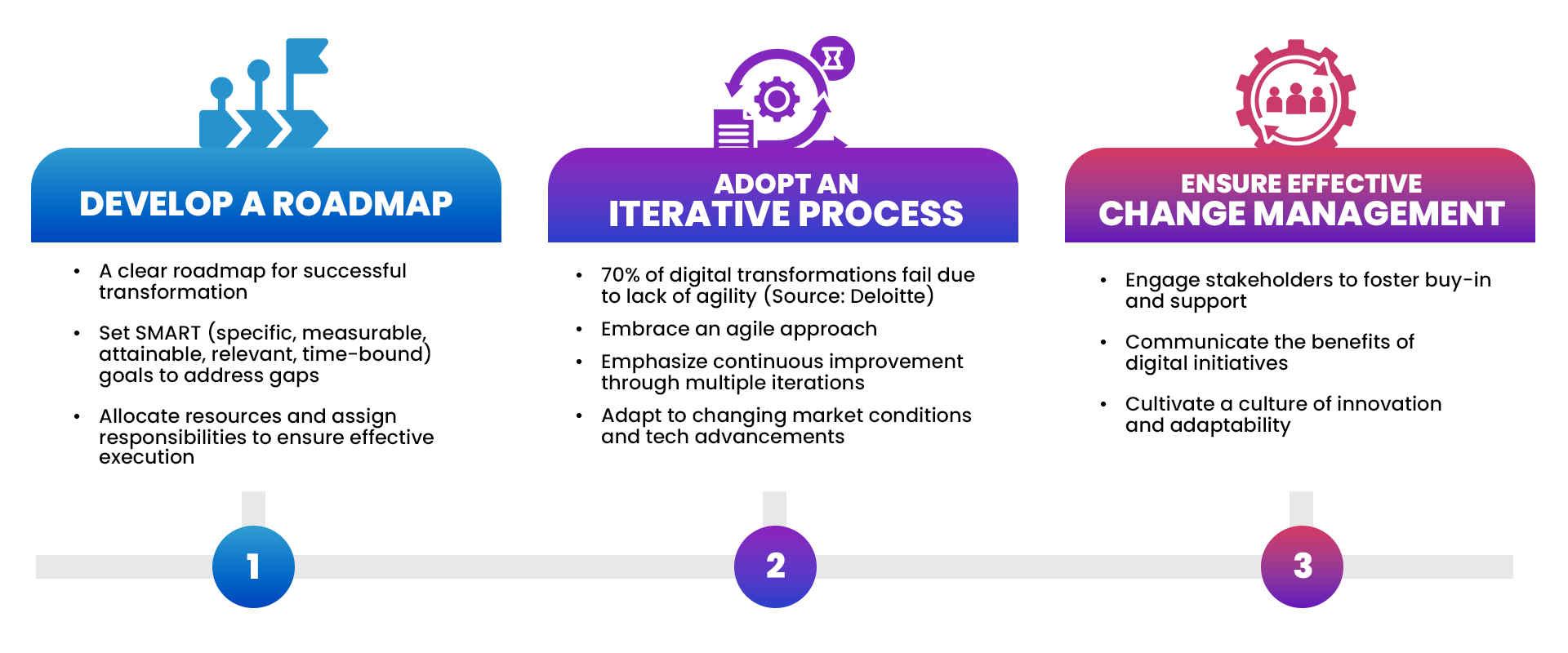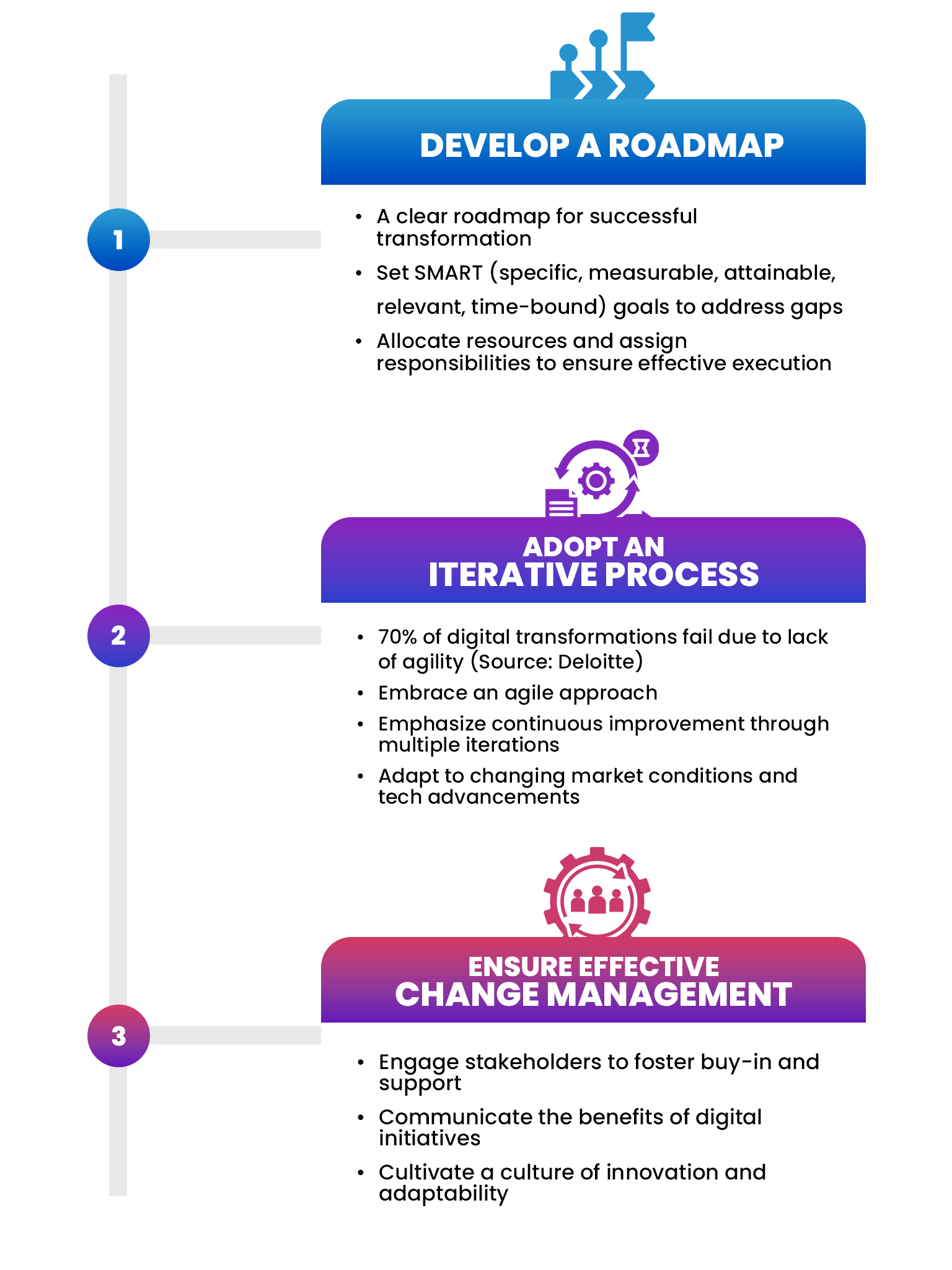Digital maturity involves a company’s ability to leverage technology effectively across all areas of its operations. More than having the latest and trending tools and technology, being digitally mature also involves factors like the sophistication of your IT infrastructure, data management practices, employee digital skills, and customer experience strategies.
The success of an organization hinges on its digital readiness, a critical step in ensuring long-term growth as companies increasingly rely on digital technologies to drive innovation, improve operational efficiency, and meet changing customer demands. Understanding your company’s digital strengths and weaknesses helps identify gaps in current capabilities and optimize processes to align with business goals.
Why assess digital maturity?
- To stay competitive
The digital revolution is in full swing and businesses that neglect to adapt risk falling behind. Companies leading in leveraging digital technologies and transforming their business models outperform their less digitally mature counterparts by up to six times on total shareholder returns (TSR). Embracing digital transformation fosters agility and enables companies to respond to market shifts swiftly, driving innovation and growth. - To align with business goals
More than having the latest technology, digital maturity is about ensuring your digital capabilities align with your business objectives. According to Gartner, 87% of senior business leaders say digitalization is a company priority. Evaluating your digital readiness helps identify technologies that can streamline operations, improve efficiency, and support your strategic objectives. - For risk management
A comprehensive evaluation of digital maturity also plays a crucial role in risk management. The average cost of a data breach globally was $4.45 million in 2023. By proactively identifying potential vulnerabilities in your tech infrastructure, data management practices, and workforce competencies, you can mitigate risks before they escalate into significant issues that disrupt business operations.
Key areas to evaluate
Evaluating your company’s digital maturity involves a thorough assessment of several key areas, each contributing to the overall readiness of your organization to thrive in a digital-first world.
1. Tech infrastructure
Your tech infrastructure forms the backbone of your digital capabilities. Assessing the current state of your IT systems and software is essential to understanding how well they support your business needs. This includes evaluating your tech stack’s age, compatibility, and efficiency. Identify areas where upgrades or replacements may be needed. Gartner forecasts that worldwide IT spending will total $5.26 trillion in 2024, an increase of 7.5% from 2023, highlighting the importance of investing in modern technologies.
A robust and flexible infrastructure ensures that your organization can quickly respond to market changes and scale operations as needed. Can your infrastructure handle increasing data volumes and support future growth? The World Economic Forum’s Global Risks Report identified technological acceleration to pose risks when unchecked. Ensure your technology can adapt to emerging trends and threats and integrate with new solutions.
2. Data management
Effective data management is critical to making informed business decisions. Based on a study by International Data Corporation (IDC), the Global DataSphere will hit 175 zettabytes by 2025. This explosion of data underscores the importance of having strong data security and privacy measures in place. Evaluate your data protection measures and ensure compliance with regulations. The 2024 Thales Data Threat Report revealed a 27% increase in companies that became victims to a ransomware attack and 43% of enterprises failed a compliance audit and are 10 times more likely to be a data breach victim, emphasizing the critical need for strong data security.
The accuracy, completeness, and accessibility of your data are crucial for informed decision-making. High-quality data accessible to decision-makers can provide valuable insights that drive strategic initiatives. An Ernst & Young report states that 81% of companies agree that data should be at the heart of all decision-making. However, most still use analytics in an isolated way, limiting their data’s potential value. A study by Forrester Consulting found that data-driven companies are 58% more likely to exceed their revenue goals and 162% more likely to surpass their goals than their competitors. Implement data management practices that ensure data is readily available for analysis.
3. Workforce competency
The digital maturity of your organization is also dependent on the skills and knowledge of your employees. A survey by PwC revealed that 74% of CEOs are concerned about the lack of availability of the right skills within their organization and how that would constrain growth. Evaluate their digital literacy and identify any skill gaps.
The World Economic Forum’s Future of Jobs Report estimated that 50% of all employees will need reskilling by 2025, highlighting the importance of continuous learning. Investing in training programs and upskilling initiatives is essential to ensuring your workforce is equipped to navigate the complexities of digital transformation. Provide ongoing training and development opportunities to ensure your employees remain proficient in the latest digital tools and technologies.
4. Business process
Did you know that around 42% of business tasks are expected to be automated by 2027? Identify processes that can be streamlined or automated to improve efficiency and reduce costs.
Evaluate how well different departments and systems communicate and share information. Seamless integration is crucial for eliminating silos and ensuring that data flows freely across the organization.
5. Customer experience
Analyze all customer interactions across various digital channels. A report by Salesforce states that 88% of customers believe that the experience a company provides matters as much as its products or services. Optimize your digital touchpoints’ user interface (UI) and user experience (UX) to ensure a positive and consistent experience.
Implement mechanisms to gather customer feedback and leverage data analytics to gain insights. A client-centric approach is a significant factor in successful business digitalization, with 62% of client-centric companies proving to be more profitable compared to companies that are not.
Identifying areas for improvement
- Gap analysis
Compare your current digital capabilities with industry benchmarks or best practices using recognized frameworks like McKinsey’s Digital Quotient or Deloitte’s Digital Maturity Model. Pinpoint specific areas where your company is lagging. For example, companies that have embraced AI and advanced analytics are likely to outperform their peers. If your data management practices are not up to par with industry standards, it could hinder your ability to make data-driven decisions. - Prioritization
Once gaps have been identified, prioritize them based on their impact on your business goals. Determine the most critical areas that need immediate attention and those that are essential for long-term growth. Balancing quick wins with long-term improvements ensures your organization can achieve sustainable digital transformation.
Taking action towards digital maturity


Champions of agility and digital transformation
At Stratpoint, we advocate the Agile methodology for its flexibility, rapid iteration, and customer-centric approach to digital transformation. Agile’s value lies in its ability to break down large, complex projects into manageable increments, allowing continuous feedback and improvement. This approach reduces risks and ensures your digital transformation initiatives align with evolving business needs.
With a proven track record of successful digital transformation projects, Stratpoint has the knowledge and expertise to guide your company through every stage of the process, including evaluating your organization’s digital maturity and providing recommendations on addressing gaps, leveraging our expertise in software development, Cloud, data, artificial intelligence, and quality assurance.
Gain access to industry experts and enterprise-grade solutions to meet the unique needs of your business. Have a strategic partner who will guide you through every stage of digital transformation, ensuring that your digital maturity is continuously evolving.
Start assessing your digital readiness
If you’re ready to start your digital maturity evaluation or revisit your digital transformation strategy, Stratpoint can provide the expertise and tools you need to succeed. Learn more about #StratpointSoftware services.




